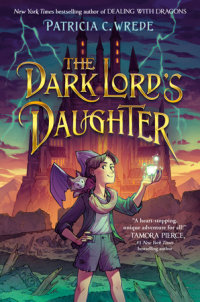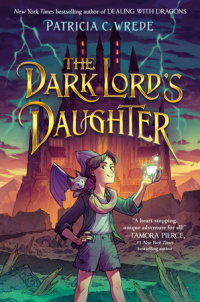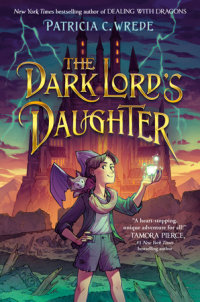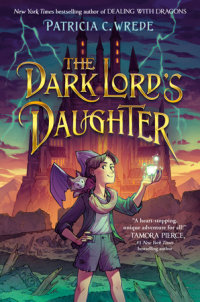The Dark Lord's Daughter
Author Patricia C. Wrede





The Dark Lord's Daughter
The Dark Lord's Daughter is a part of the The Dark Lord's Daughter collection.
From the New York Times bestselling author of Dealing with Dragons comes this timeless fantasy, about an ordinary girl who discovers she's the heir to a dark throne, and must find her place between her life on Earth and her magical inheritance. Now in paperback!
"A heart-stopping, unique adventure for all!" —Tamora Pierce, #1 New York Times bestselling author
Kayla is just an ordinary girl . . . or so she thinks. When a day at the…
From the New York Times bestselling author of Dealing with Dragons comes this timeless fantasy, about an ordinary girl who discovers she's the heir to a dark throne, and must find her place between her life on Earth and her magical inheritance. Now in paperback!
"A heart-stopping, unique adventure for all!" —Tamora Pierce, #1 New York Times bestselling author
Kayla is just an ordinary girl . . . or so she thinks. When a day at the state fair is interrupted by the news that she’s the daughter of a “Dark Lord,” she and her family are quickly whisked to another world—one that’s chock-full of magic but lacking in technology!
As her family encounters fantastical creatures in place of their Earthly gadgets, Kayla must prepare for the unpreparable: meeting her father, the Dark Lord himself, for the very first time. All Kayla wants is to go home, but she must learn magic to do so. The catch? For the Dark Lord’s daughter, the road to mastering magic is filled with evil traditions.
As she ventures closer to her father, Kayla must decide whether to accept her birthright. Is she destined for darkness? Or can she become a new kind of Dark Lady?
An Excerpt fromThe Dark Lord's Daughter
Chapter 1
So You Are a Potential Dark Lord
According to popular belief, the ability to utilize Dark magic can erupt anywhere, at any time, in anyone. In practice, Dark power is nearly always inherited, though sometimes from a remote ancestor.
--Introduction to The Dark Traditions
The long line moved slowly across the bus parking lot toward the entrance gates of the State Fair. Halfway up the line, fourteen-year-old Kayla Jones scowled absently at a spot where the green glitter nail polish had slopped over the side of her fingernail. She’d been hoping to come to the State Fair with someone besides family this year, but Madison and her other friends had lost touch when Kayla’s family moved to the apartment, and she hadn’t made new ones yet.
Besides, the fair had been a Jones family tradition as far back as Kayla could remember, and family traditions had kept them going for the last four years. Mostly small ones, like Saturday-morning pancakes and the weekly visit to the park by Lake Nokomis, but Rikita Jones…
Chapter 1
So You Are a Potential Dark Lord
According to popular belief, the ability to utilize Dark magic can erupt anywhere, at any time, in anyone. In practice, Dark power is nearly always inherited, though sometimes from a remote ancestor.
--Introduction to The Dark Traditions
The long line moved slowly across the bus parking lot toward the entrance gates of the State Fair. Halfway up the line, fourteen-year-old Kayla Jones scowled absently at a spot where the green glitter nail polish had slopped over the side of her fingernail. She’d been hoping to come to the State Fair with someone besides family this year, but Madison and her other friends had lost touch when Kayla’s family moved to the apartment, and she hadn’t made new ones yet.
Besides, the fair had been a Jones family tradition as far back as Kayla could remember, and family traditions had kept them going for the last four years. Mostly small ones, like Saturday-morning pancakes and the weekly visit to the park by Lake Nokomis, but Rikita Jones managed at least one big event every three or four months, no matter how dire their other circumstances. So here they were: Kayla, with her adoptive mother and brother, standing in line at nine in the morning.
“You could at least have let us sleep late,” she muttered at Riki’s back.
“What?” Riki started to turn, then paused. “No, Del, we’re not stopping at the cookie barn first thing. It’s too early, and you’re wired enough without adding sugar.”
“Can I get a turkey leg, then?” Del begged. “Or the roast corn? Those are healthy. Or no, I want the deep-fried alligator on a stick!”
“You just had breakfast!” Riki said in tones of despair. “How can you want more food already?”
“You only want the alligator because you think it sounds neat,” Kayla told her younger brother.
Del gave her a wide-eyed look and bounced on the heels of his running shoes with ten-year-old energy. “So? That’s why they bring it up here to sell, isn’t it? There aren’t any alligators in Minnesota. Can I have some, Mom?”
“Maybe later.” Riki adjusted her sunglasses and tipped her maroon-and-gold baseball cap a little higher on her thick black curls. “Kayla honey, are you sure you don’t want a hat? I brought extras.” She raised her bulging canvas tote bag.
Kayla squinted at the sky. The hazy, cloudless blue of late August promised the fair’s traditional hot and humid weather, but in a moment of insanity two weeks before, she’d had Riki cut her dark hair mercilessly short, and wearing a baseball cap over it made her look like a boy. More like a boy. “Maybe later,” she echoed.
The line inched forward; Kayla shifted her backpack and closed the gap. Delmar bounced on his heels again and asked, “Can we start on the Midway? I want to do the frog toss.”
“No!” Kayla said before their mother could answer. Standing around watching Del toss frog-shaped beanbags at plastic lily pads in an attempt to win one of the stuffed animals had been boring enough last year, when it was a new game.
Riki frowned. “Kayla!”
“Fine, but if he wins another giant stuffed penguin, I’m not carrying it around all day!”
Riki’s expression went thoughtful. “Good point. Maybe on our way out, Del.”
“Awww.”
“Quit whining. What are you, five?” Kayla said.
Del subsided--for the moment--and they moved forward again. They had almost reached the security screening, and Riki was fishing in her canvas tote for the advance tickets.
“Do you think Dad would have come with us?” Del asked. “To the fair, I mean.”
“Del!” Kayla shot a quick glance at their mother’s back, but Del had kept his voice down and Riki was absorbed in her ticket hunt. Del had only been six when cancer killed Michael Jones, and Kayla often thought that it was highly unfair that she, the adopted child, should be the one with many clear memories of their father, while Del, the unlooked-for biological offspring, had only a few blurry mental images and whatever he could piece together from photos and the things Kayla and Riki told him.
“Dad would have made us come three or four times,” she told Del quietly. “Maybe every day.” She hesitated. “And he’d have been really excited about that penguin you won last year.”
Del grinned. “Thanks, Kayla.” He opened his mouth as if he wanted to ask something else, but Riki turned and he snapped his lips closed. Kayla suppressed a relieved sigh. Even after four years, mentioning their father was still as likely as not to put Riki in a gloomy mood, but Del didn’t always remember to avoid the subject.
Riki hadn’t noticed; she was still digging through her tote bag and muttering. “Discount coupon book, ibuprofen, tissues, cell phone, water . . . Kayla, your backpack is nearly empty. Would you take one of these bottles?”
“I left it empty on purpose, Mom!” Kayla grumbled, but she accepted two of the plastic containers and stowed them away. At least they were only a temporary load.
They reached the screener, who checked the tote and backpack with brisk efficiency, scanned their tickets, and passed them through the gate without comment. The red brick of the grandstand loomed on their left, a tall, dark contrast to the one-story display buildings, small stages, and food booths that lined the street beside it. To the right stretched the rides and games of the Midway. Even this early in the day, it was all bright colors and motion, shrieking riders and rumbling machinery. The smell of machine oil mingled with the scents of dust, people, strange foods being deep-fried, beer, and animals--a little of everything, like the fair itself.
Straight ahead, over the sea of baseball caps and sun hats, Kayla could see the Warner Coliseum and the animal barns. She had always liked those, but she knew better than to suggest starting there. They’d been Michael’s favorite, too, and Riki hadn’t taken them back even once since his death.
The bungee ball ride flew into sight above the treetops, the round cage with its two screaming occupants trailing the four elastic ropes that flung it up and then slowed its fall. Delmar’s eyes widened. “Mom! Can we do that?”
“I don’t think it’s safe,” Riki said. “Or in the budget. And anyway, you aren’t tall enough.”
“You just don’t want me to have any fun!”
“Of course not,” Riki told him. “That’s part of my job, to keep you from having fun. It’s in the parenting handbook.”
“I thought we were going to do the Midway stuff last,” Kayla said, hoping to sidetrack the discussion before it turned into an argument. She looked around for a distraction that didn’t involve food, memories of better times, or anything that would have to be carried around for the rest of the day. “Hey, what about the Skyride? We could take it down to the far end of the fair and walk back.”
After a quick check of the coupon book, Riki approved this program, though Del complained that the Skyride was just a fancy chair lift and didn’t compare to the bungee ball. The line was short; they paid for the discounted tickets and were soon soaring over the fair in a glass-and-steel box barely large enough for the three of them. Kayla’s bad mood began to fade. Del pressed his nose to the glass, commenting on the booths and rides and people below. By the time they reached the ground at the other end, he had a dozen places he wanted to visit, including at least six food vendors, the parade lineup, the giant slide, and a couple of open stages.
They ducked into the Horticulture Building to see the crop art. For several years, Kayla had publicly maintained that gluing seeds to boards to make pictures was more of a kindergarten activity than something for adults; privately, she was amazed by the detail people achieved. This year, there was a three-foot picture of a Lakota Indian in full traditional garb that was especially impressive--and she was secretly glad that Riki insisted on keeping the exhibit on her list of fair “must do” activities.
They skipped the rest of the horticulture exhibits (who wanted to look at row after row of apples and corn and dried beans?) and crossed the street to the International Bazaar. The first booth had a row of leather backpacks on display. Kayla eyed them wistfully, but she knew better than to ask. Even at discounted State Fair prices, they couldn’t afford one.
They browsed the booths, which sold everything from dashikis to Russian nesting dolls. When Del started to get bored, they made a quick stop to cash in the coupon for a bag of cinnamon-sugared almonds at the spiced-nut booth. The bag went into Riki’s tote for later, and they headed back toward the exit from the bazaar.
On the way out, a man in a black-and-white cow costume was handing out sample packets of beef jerky and brochures advertising some event by the animal barns. Del collected three of the packets, one for each of them, though he was clearly only interested in the food. Riki pursed her lips but stowed two of the packets in her tote without comment, and they made it to the main street without further incident.
In the brief time they’d spent at the bazaar, the crowd outside had doubled. “Stay close,” Riki told them. “I don’t want to lose either of you.”
“Hey, mini donuts!” Del said around a bite of beef jerky. He looked at his mother hopefully. “We can’t come to the fair and not have mini donuts!”
“You already have something,” Riki pointed out with a grin. “Pace yourself.” She looked around and headed for an information booth just up the block. Kayla trailed along behind with a sinking feeling. Sure enough, Riki was asking about the Home Improvement building.
“Mom!” she objected. “Could you find anywhere more boring in the whole fair?”
“They always have special State Fair deals,” Riki replied. “And they might have something we can use in the new apartment. Besides, going through one of the boring grown-up buildings is an essential part of the fair experience.”
“Like the Midway?” Del said.
“All right, Del, we’ll head back that way after I’m done,” Riki promised.
“Can I just wait here?” Kayla asked. “There’s a bench.” Without waiting for a response, she sat down and reached into her backpack.
“No,” Riki said. “It’s a couple of blocks each way; I don’t want you sitting here alone for that long. Besides, you’ll get bored.”
“I’ll be fine.” Kayla pulled out her new school-issued tablet computer. She’d only had it for a couple of days, so she hadn’t gotten it fully customized yet, but she’d installed all the operating-system upgrades, the encyclopedia app, and most of her music.
“Oh, honey, you didn’t bring that thing with you to the fair!” Riki sounded as if she couldn’t decide whether she was amused or horrified.
Kayla looked at the tablet, then waved it up and down a couple of times. “Looks real to me,” she said. “Wake up, Macavinchy.”
The tablet’s screen lit, and a deep male voice with a British accent said, “Good morning, madam. What can I do for you?”
Kayla grinned at her mother’s startled expression. She’d spent two hours last night listening to different voice files before she found one she liked enough to download. The Wi-Fi connection lit up, so before her mother could object, she asked, “Macavinchy, where are the best household deals at the Minnesota State Fair?”
“Kayla, really, that’s--”
The screen cleared and a list appeared of booths demonstrating everything from siding and windows to hot tubs and plastic furniture. “There, Mom,” Kayla said, holding up the tablet so she could see.
“Would you like to view these locations on a map?” Macavinchy asked after a moment.
“Uh, that one,” Riki said, pointing.
“Macavinchy, show me where the George’s Sturdy Modern Antiques booth is at the Minnesota State Fair,” Kayla told the computer.
“Why did you give your computer a stupid name?” Del asked, peering over the back of the bench.
“I like it,” Kayla said. “And if you think it’s stupid, it’s probably the best idea ever.”
“No arguing,” Riki said absently. She was peering at the map on the computer screen, then at the buildings around them.
“Macavinchy, add current location,” Kayla said.
“Of course, madam.” A bright red dot appeared a little south of the blue arrow that marked George’s Sturdy Modern Antiques.
“If you got a smartphone, it would do that,” Del pointed out to their mother.
“Smartphones are expensive,” Riki said absently, “and the flip phone works fine.”
“Your flip phone is purple,” Del said in disgust.
“It’s lavender, and a new one is still expensive.” Riki studied the map for another minute, then smiled. “It’s two blocks north and one over. Come on, you two. I get to look at furniture, and then each of you can pick something to do next.”
“Fine. Good night, Macavinchy,” Kayla said, and stuffed the tablet back into her backpack. She’d really been hoping to play with it, but avoiding the Home Improvement building was worth a lot. Even if they had to watch while Riki grilled the furniture people, it was only one booth, not a whole building’s worth of displays.
They headed up the street, which was already crowded. As they approached the first corner, they heard the loud, buzzing crackle that accompanied someone talking into a microphone that had been turned up too high. “It’s a TV spot!” Del said, and surged forward.
Kayla and Riki followed. They caught up with him on the far side of the street near a small stage. At the back of the stage, a large screen was running previews of the new fall season; in front of it, three rows of wooden benches filled the boulevard. The benches were half-full of unusually attentive fairgoers. The announcer with the too-loud microphone stood at the near corner of the stage, next to a row of people who apparently represented characters from the various shows on the screen. The first was a man in a purple face mask and spangled tights; next to him stood a woman in a white lab coat, a teenage girl with blue hair, and a man in an old-fashioned frock coat carrying a riding crop. The last one was a muscular blond man wearing chain mail, with a large sword strapped to his back. The preview that was playing showed someone similar battling hordes of people in black armor.
Del squinted at the stage, then at the screen. “They aren’t the real actors,” he said in disappointment.
“Come on,” Riki said. “We can see this at home.”
“We can’t see live people,” Del objected.
